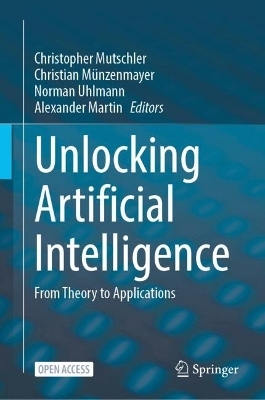
Unlocking Artificial Intelligence
Springer International Publishing (Verlag)
978-3-031-64831-1 (ISBN)
- Noch nicht erschienen - erscheint am 30.08.2024
- Versandkostenfrei innerhalb Deutschlands
- Auch auf Rechnung
- Verfügbarkeit in der Filiale vor Ort prüfen
- Artikel merken
This open access book provides a state-of-the-art overview of current machine learning research and its exploitation in various application areas. It has become apparent that the deep integration of artificial intelligence (AI) methods in products and services is essential for companies to stay competitive. The use of AI allows large volumes of data to be analyzed, patterns and trends to be identified, and well-founded decisions to be made on an informative basis. It also enables the optimization of workflows, the automation of processes and the development of new services, thus creating potential for new business models and significant competitive advantages.
The book is divided in two main parts: First, in a theoretically oriented part, various AI/ML-related approaches like automated machine learning, sequence-based learning, deep learning, learning from experience and data, and process-aware learning are explained. In a second part, various applications are presented that benefit from the exploitation of recent research results. These include autonomous systems, indoor localization, medical applications, energy supply and networks, logistics networks, traffic control, image processing, and IoT applications.
Overall, the book offers professionals and applied researchers an excellent overview of current exploitations, approaches, and challenges of AI/ML-related research.
Christopher Mutschler is Director of the Positioning and Networks Division at Fraunhofer IIS. His research is located at the intersection of machine learning (in particular, reinforcement learning) and radio-based positioning. He coordinates activities on foundational research across different business units. Christopher has published more than 70 papers at major machine learning venues such as IJCNN, TMLR, JMLR and ICML.
Christian Münzenmayer is Head of the Digital Health and Analytics Department and part of the management team of the Smart Sensing and Electronics Division at Fraunhofer IIS. His research interests center on medical engineering, machine learning for image and bio signal analysis as well as their medical applications. He is author of over 60 publications in scientific journals and proceeding volumes. Christian also serves as a member of the expert commission for medical technology for the Bavarian Ministry of Economic Affairs, Regional Development and Energy.
Norman Uhlmann is Director of the Development Center for X-Ray Technology EZRT Division at Fraunhofer IIS. His research activities are in the field of imaging physics and data analysis with the focus of x-ray imaging from the nano scale structures to a large scale on different types of imaging systems, like lab-based CT systems and synchrotrons for a very wide field of applications like material characterization, quality assurance, security, agriculture and sorting.
Alexander Martin is Director at Fraunhofer IIS, Founding Vice President of the University of Technology Nürnberg (UTN), and heads the lab on "Analytics and Optimization". His research interests are the theory and solution of mixed-integer linear and nonlinear optimization problems with applications in AI, energy, mobility, and logistics. Alexander published more than 150 papers and has been coordinator of various research projects as well as member of several editorial boards of international top journals.
Part I: Theory.- 1. Automated Machine Learning.- 2. Sequence-Based Learning.- 3. Learning from Experience.- 4. Learning with Limited Labelled Data.- 5. The Role of Uncertainty Quantification.- 6. Process-Aware Learning.- 7. Combinatorial Optimization.- 8. Acquisition of Semantics for Machine-Learning and Deep-Learning based Applications.- Part II: Applications.- 9. Assured Resilience in Autonomous Systems.- 10. Data-driven Wireless Positioning.- 11. Comprehensible AI for Multimodal State Detection.- 12. Robust and Adaptive AI for Digital Pathology.- 13. Safe and Reliable AI for Autonomous Systems.- 14. AI for Stability Optimization in Low Voltage Direct Current Microgrids.- 15. Self-optimization in Adaptive Logistics Networks.- 16. Opitmization of Undergroud Train Systems.- 17. AI-assisted Condition Monitoring and Failure Analysis for Industrial Wireless Systems.- 18. XXL-CT Dataset Segmentation.- 19. Energy-efficient AI on the Edge.
| Erscheint lt. Verlag | 30.8.2024 |
|---|---|
| Zusatzinfo | X, 370 p. 200 illus., 184 illus. in color. |
| Verlagsort | Cham |
| Sprache | englisch |
| Maße | 155 x 235 mm |
| Themenwelt | Informatik ► Theorie / Studium ► Künstliche Intelligenz / Robotik |
| Schlagworte | Artificial Intelligence • data annotation • Geographical Information Systems • Healthcare informatics • logistics and transportation applications • machine learning • open access • Time-series analysis |
| ISBN-10 | 3-031-64831-5 / 3031648315 |
| ISBN-13 | 978-3-031-64831-1 / 9783031648311 |
| Zustand | Neuware |
| Haben Sie eine Frage zum Produkt? |
aus dem Bereich


